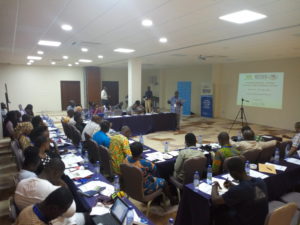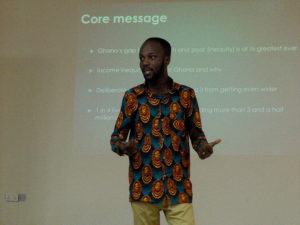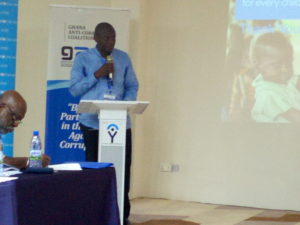Prof. Kwame Karikari, Board Chair, Graphic Communications Group has challenged the citizenry to rise up and demand for their rights from public officers.
Prof. Karikari who moderated a training workshop on inequality from 11th– 12th May in Ho, Volta Region said there is a huge disparity between the rich and poor and those put at the helm of affairs are virtually making no efforts to bridge this gap but widening it yet, Ghanaians tolerate them.
The two-day capacity building workshop for media and civil society organisations (CSOs) on inequality in Ghana was jointly organised by international non-governmental organisation (NGOs ) including UNICEF, OXFAM, SEND-Ghana and the Ghana Anti-Corruption Coalition (GACC) that champion the fight against inequalities in health systems, education, etc.

The training sought to increase capacity of the media and CSOs on inequality and how best to advocate for the fight against it.
Prof. Karikari blamed the two ruling parties in the Fourth Republic, the New Patriotic Party and the National Democratic Congress that they scramble for power only and not for social change that will reduce the inequality that stares in the face of majority of Ghanaians.
He said until the people visit local assemblies, their members of parliament, etc, and demand fair distribution of national resources, “democracy is illusive” because everyone has one vote during elections but when it comes to resources, the few elites get the larger share.

Social Policy Specialist at UNICEF, Mr. Charlse Dzradosi in his presentation explained it became necessary for the Organisation to collaborate with the other partners because inequality affects Ghanaians, young and old and prevails in every sector of the economy.
He decried the inequality in the health sector saying, 54% of qualified doctors are in the nation’s capital, the rest spread around the other capitals with few in the rural areas.
Mr. Dzradosi said there is the need for journalists to identify the missing links in government’s policies and programmes, ask the right questions to ensure even distribution noting, “nobody should be poor because of where they are living.”

Mr. Zakaria Sulemana, OXFAM Ghana disclosed that though Ghana has made economic gains over the years, the gap between the few rich and the majority poor keeps widening and inequality “rising to unacceptable heights.”
To him, as inequality manifests in income, gender, disability among others, it threatens long-term social and economic development, destroys self worth and leads to poverty, social unrest, crime, disease, etc.
He therefore, called on the media and CSOs to collaborate with NGOs in the fight against inequality in the country, be it economic, social, political or spatial to make Ghana, a better place for all.
Meanwhile, Justice Baidoo, Communications Consultant took the media through possible ways of identifying issues of inequality and reporting on them using best practices to engender the right responses.
By: Ewoenam Kpodo/voltaonlinegh.com




